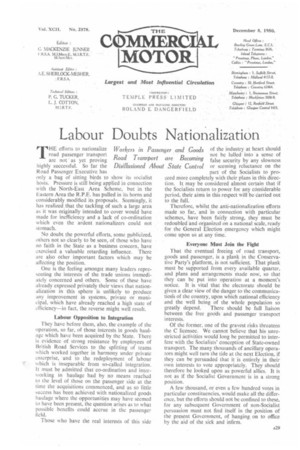Labour Doubts Natiorialization
Page 31

If you've noticed an error in this article please click here to report it so we can fix it.
THE efforts to nationalize road passenger transport are not ' as yet proving highly successful. So far the Road Passenger Executive has only a bag of sitting birds to show its socialist hosts. Pressure is still being applied in connection with the North-East Area Scheme, but in the Eastern Area the R.P.E. has pulled in its horns and considerably modified its proposals. Seemingly, it has realized that the tackling of such a large area as it was originally intended to cover would have made for inefficiency and a lack of co-ordination which even the ardent nationalizers could not stomach.
No doubt the powerful efforts, some publicized. others not so clearly to be seen, of those who have no faith in the State as a business concern, have exercised a valuable retarding influence. There are also other important factors which may be affecting the position.
One is the feeling amongst many leaders representing the interests of the trade unions immediately concerned and others. Some of these have already expressed privately their views that nationalization in this sphere is unlikely to produce any improvement in systems, private or municipal. which have already reached a high state of efficiency—in fact, the reverse might well result.
Labour Opposition to Integration They have before them, also, the example of the operation, so far, of those interests in goods haulage which have been acquired by the State. There is evidence of strong resistance by employees of British Road Services to the splitting of teams which worked together in harmony under private enterprise, and to the redeployment of labour which is inseparable from so-called integration. It must be admitted that co-ordination and interworking in haulage had by no means reached• to the level of those on the passenger side at the time the acquisitions commenced, and as so little success has been achieved with nationalized goods haulage where the opportunities may have seemed to have been present, the question arises as to what possible benefits could accrue in the passenger field.
Those who have the real interests of this side of the industry at heart should not be lulled into a sense of false security by any slowness or seeming reluctance on the part of the Socialists to proceed more completely with their plans in this direction. It may be considered almost certain that if the Socialists return to power for any considerable period, their aims in this respect will be carried out to the full.
Therefore, whilst. the anti-nationalization efforts made so far, and in connection with particular schemes, have been fairly strong, they must be redoubled and organized on a national scale, ready for the General Election emergency which might come upon us at any time.
Everyone Must Join the Fight That the eventual freeing of road transport, goods and passenger, is a plank in the Conservative Party's platform, is not sufficient. That plank must be supported from every available quarter, and plans and arrangements Made now, so that they can be put into operation at •a moment's notice. It is vital that the electorate should be given a clear view of the danger to the communicatiods of the country, upon which national efficiency and the well being of the whole population so greatly depend. There should be full liaison between the free goods and passenger transport interests.
Of the former, one of the gravest risks threatens the C licensee. We cannot believe that his unrestricted activities would long be permitted to interfere with the Socialists' conception of State-owned transport. The many thousands of ancillary operators might well turn the tide at the next Election, if they can be persuaded that it is entirely in their • own interests to vote appropriately. They should therefore be looked upon as powerful allies. It is not as if the Socialist GOvernment is in a strong position.
A few thousand, or even a few hundred votes in particular constituencies, would make all the difference, but the efforts should not be confined to these, for any subsequent Government of non-Socialist persuasion must not find itself in the position of the present Government, of hanging on to office by the aid of the sick and infirm.




























































































